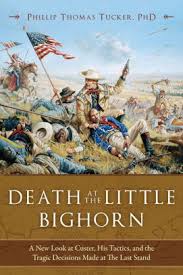Wednesday, June 6, 2018
Phillip Thomas Tucker's New Look at Custer's Last Stand
Historian Phillip Thomas Tucker, PhD, an award-winning and ground-breaking author, is taking a fresh and new look at major events and iconic turning points in American history. Phillip Thomas Tucker, PhD, a former Department of Defense historian and prolific author of more than 40 books, has written extensively on a wide variety of subjects in American history.
Much of Dr. Tucker’s work focuses on various aspects of military history, including his ground-breaking book, Death at the Little Bighorn, A New Look at Custer, His Tactics, and the Tragic Decisions Made at the Last Stand. While many historians concentrate on the catastrophic results of Custer's tactical decisions late in this famous battle, Dr. Tucker contends that the initial plan Custer made was not as disastrous as most think. Dr. Tucker’s book is based on accounts from sources that most historians have overlooked, including Native Americans who were present at the battle and the preceding battle (ironically, the most forgotten clash of arms that occurred at the beginning of the Battle of Little Bighorn) at Medicine Tail Coulee Ford.
In Dr. Tucker’s well-documented and thoughtful view of events that are right on target, the charge at Medicine Tail Coulee Ford was intended to be an overpowering strike to turn the tide. However, Lieutenant Colonel George Armstrong Custer was wounded during this charge, which signaled the beginning of the end for his five companies of the 7th Cavalry, as it caused his command to fall into disarray and ultimately resulted in disaster. Tucker has presented another "new look" of one of America's most famous battles, presenting a fresh perspective to give up a better and more thorough understanding of what really happened at the Little Bighorn on June 25, 1876.
One respected reviewer emphasized the importance of this ground-breaking book: "Custer's last movements and decisions have been argued about since 1876, but, in my mind, no one has made a stronger case for what really happened than Phillip Thomas Tucker in this compelling and convincing narration."
